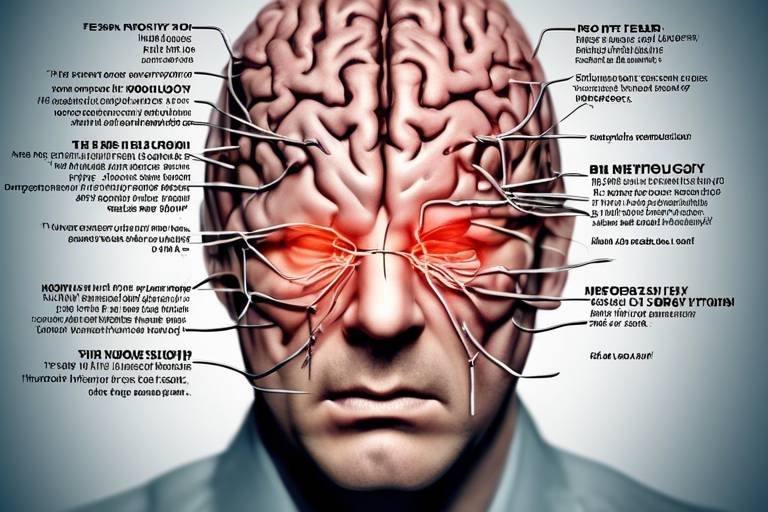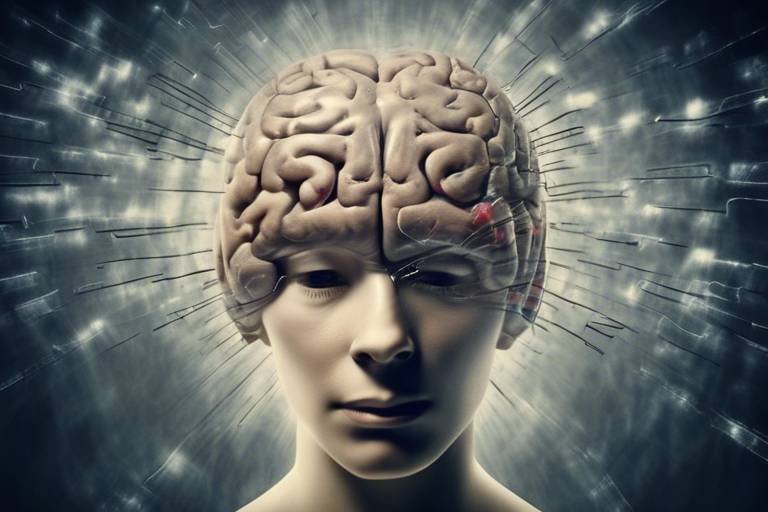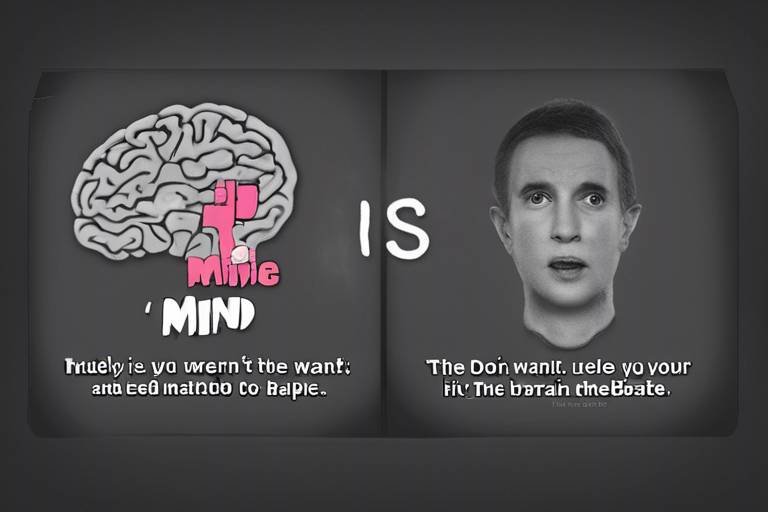Challenging the Traditional Views on Mind Philosophy
Welcome to the fascinating world of mind philosophy, where we dive deep into the intricate layers of consciousness, identity, and the ever-elusive mind-body relationship. Traditionally, philosophers have held steadfast views that often seem unshakeable. Yet, as we peel back the layers of established beliefs, we find ourselves confronted with contemporary perspectives that challenge the status quo and invite us to rethink what we know about the mind.
Imagine standing on a bridge, looking out over a vast river that represents the flow of philosophical thought. On one side, you have the traditional views, grounded in dualism, materialism, and idealism. On the other side, a new landscape emerges, rich with the insights of neuroscience, cognitive science, and even the burgeoning fields of artificial intelligence and consciousness studies. This article serves as your guide across that bridge, exploring the bold ideas that are reshaping our understanding of the mind.
As we embark on this journey, we will encounter questions that have puzzled thinkers for centuries. What is consciousness? Is it merely a byproduct of brain activity, or does it hold a more profound significance? How do our perceptions shape our reality? These questions are not just academic; they resonate with our everyday experiences. After all, who hasn’t pondered the nature of their thoughts or the essence of their identity at some point in life?
In this exploration, we will delve into the dualism debate, examining its historical roots and the challenges posed by modern neuroscience. We will juxtapose materialism and idealism, two philosophies that offer contrasting views on reality and consciousness. Furthermore, we will discuss the hard problem of consciousness, which remains a formidable challenge in both philosophy and science.
But it’s not all abstract theorizing. We will also look at practical implications and real-world applications of these philosophical ideas. For instance, how do advancements in neuroscience influence our understanding of mental health? How can a deeper grasp of consciousness inform the development of artificial intelligence? The intersection of philosophy, science, and technology opens up a realm of possibilities that could redefine our understanding of what it means to be human.
As we navigate through these complex ideas, it’s essential to remember that philosophy is not just about finding answers; it's about asking the right questions. It’s about fostering a dialogue that encourages us to think critically and creatively about the nature of our existence. So, buckle up as we challenge traditional views and explore the exciting frontiers of mind philosophy!
- What is mind philosophy? Mind philosophy explores the nature of the mind, consciousness, and their relationship to the body and the external world.
- What is dualism? Dualism is the belief that the mind and body are distinct entities that interact but are fundamentally different in nature.
- What are materialism and idealism? Materialism posits that only physical matter exists, while idealism asserts that reality is mentally constructed or immaterial.
- What is the hard problem of consciousness? The hard problem of consciousness refers to the difficulty of explaining why and how we have subjective experiences.
- How does neuroscience impact mind philosophy? Neuroscience provides empirical evidence that can either support or challenge traditional philosophical views about the mind and consciousness.

The Dualism Debate
The concept of dualism has long been a cornerstone in the realm of mind philosophy, positing a clear division between the mind and the body. This view, championed by philosophers like René Descartes, suggests that the mind, with its thoughts and consciousness, operates independently of the physical body. Imagine a puppet and a puppeteer: the body is the puppet, while the mind is the puppeteer pulling the strings. This analogy illustrates the traditional belief that our mental states are separate from our physical existence. However, as we dive deeper into the realms of neuroscience and cognitive science, this neat separation becomes increasingly difficult to maintain.
Historically, dualism provided a comforting framework for understanding human experience. It allowed for the possibility of an afterlife and the idea that our thoughts and emotions could transcend our physical forms. Yet, modern neuroscience challenges this comforting notion. With advances in brain imaging and neurobiology, scientists have begun to uncover the intricate connections between brain activity and mental states, raising questions about the validity of dualism. For instance, studies have shown that specific thoughts and feelings correlate with distinct patterns of brain activity, suggesting that our mental experiences are deeply rooted in our biological makeup.
Furthermore, the implications of dualism extend beyond mere academic debate; they influence how we approach issues like mental health, consciousness, and even artificial intelligence. If the mind is entirely separate from the body, how do we explain phenomena like the placebo effect, where a patient's belief in treatment can lead to real physiological changes? Or consider the implications for artificial intelligence: if consciousness is a non-physical entity, can we ever create a machine that truly thinks or feels? These questions lead to a rich tapestry of discussions that challenge the very foundations of dualistic thought.
As we navigate through this debate, it's essential to recognize the contributions of modern neuroscience, which provide compelling evidence against strict dualism. For example, research into brain injuries has shown that damage to specific areas of the brain can lead to profound changes in personality and cognitive function. This evidence suggests that our identity and consciousness are not just abstract concepts but are intricately tied to our physical selves.
In summary, while dualism has shaped our understanding of the mind for centuries, the rise of neuroscience and cognitive science presents significant challenges to this traditional view. The ongoing debate invites us to reconsider our assumptions about the relationship between mind and body, urging us to explore more integrated perspectives. As we continue to unravel the mysteries of consciousness, the dialogue between dualism and its critics will undoubtedly evolve, leading to new insights about what it means to be human.

Materialism vs. Idealism
When diving into the philosophical waters of materialism and idealism, we find ourselves navigating through two fundamentally opposing views on reality and consciousness. Materialism posits that everything that exists is either made of matter or is dependent on material conditions. In simpler terms, if it’s not physical, it doesn’t exist. On the flip side, idealism suggests that the mind and its perceptions are the primary components of reality, asserting that what we perceive shapes our understanding of existence. This philosophical tug-of-war has profound implications in various fields, including cognitive science and metaphysics.
The clash between materialism and idealism can be likened to two different lenses through which we view the world. Imagine looking at a beautiful painting; a materialist would focus on the canvas, the paint, and the brushstrokes, while an idealist would emphasize the emotions and thoughts that the painting evokes. This distinction is crucial, as it influences how we approach questions about consciousness, identity, and the nature of reality itself.
In the realm of consciousness studies, materialism often aligns itself with a scientific perspective, asserting that mental states are ultimately reducible to physical processes. For instance, when we feel joy, materialists would argue that this feeling corresponds to specific neurochemical reactions in our brains. On the other hand, idealists contend that our experiences of joy, sadness, and everything in between cannot be fully understood through physical explanations alone. They argue that emotions are tied to our subjective experiences, which are shaped by our thoughts, beliefs, and perceptions.
To further illustrate the differences between these two philosophies, consider the following table:
| Aspect | Materialism | Idealism |
|---|---|---|
| View of Reality | Reality is fundamentally material and physical. | Reality is fundamentally mental and perceptual. |
| Nature of Consciousness | Consciousness arises from physical processes in the brain. | Consciousness shapes and defines reality. |
| Approach to Knowledge | Knowledge is gained through empirical observation and scientific inquiry. | Knowledge is gained through introspection and subjective experience. |
As we engage in discussions about these philosophical perspectives, we also see their influence on contemporary debates in cognitive science. For instance, materialist theories often drive research into the neural correlates of consciousness, aiming to map specific brain activities to mental states. This approach has yielded significant insights into how our brains function but has also sparked criticism. Critics argue that by focusing solely on the physical, we risk overlooking the rich tapestry of human experience that cannot be quantified by brain scans alone.
In contrast, idealist perspectives encourage a broader exploration of consciousness, urging us to consider how our thoughts and perceptions influence our understanding of reality. This philosophical stance invites questions that challenge the materialist framework, such as: What is the nature of subjective experience? How do our beliefs shape our reality? These inquiries are vital as they push the boundaries of our understanding and invite interdisciplinary dialogue between philosophy, psychology, and neuroscience.
Ultimately, the debate between materialism and idealism is not just a theoretical exercise; it has real-world implications for how we understand ourselves and our place in the universe. As we continue to explore these ideas, it becomes clear that both perspectives offer valuable insights. Perhaps the key lies not in choosing one over the other but in recognizing how they can inform and enrich our understanding of consciousness and existence.
- What is materialism? Materialism is the philosophical view that everything that exists is either made of matter or is dependent on material conditions.
- What is idealism? Idealism is the belief that the mind and its perceptions are the primary components of reality.
- How do these philosophies influence cognitive science? Materialism drives research into the neural basis of consciousness, while idealism encourages exploration of subjective experiences.
- Can materialism and idealism coexist? Yes, many thinkers believe that integrating insights from both perspectives can lead to a more comprehensive understanding of consciousness.

Contemporary Materialist Theories
In the ever-evolving landscape of philosophy, contemporary materialist theories have emerged as a robust framework for understanding the intricate relationship between mental states and physical processes. These theories challenge the traditional dualistic views of mind and body, offering a fresh perspective that aligns more closely with advances in neuroscience and cognitive science. At the heart of contemporary materialism is the idea that all mental phenomena can be explained through physical processes occurring in the brain. This perspective not only reshapes our understanding of consciousness but also raises intriguing questions about the nature of reality itself.
One of the most compelling aspects of contemporary materialism is its reliance on empirical evidence. Researchers in neuroscience have made significant strides in mapping brain activity to specific mental states. For instance, studies using functional magnetic resonance imaging (fMRI) have demonstrated how certain areas of the brain light up during various cognitive tasks. This empirical approach provides a tangible link between the physical brain and our subjective experiences, suggesting that our thoughts, emotions, and perceptions are deeply rooted in the biological substrate of our being.
Moreover, contemporary materialist theories often incorporate insights from evolutionary biology, positing that consciousness itself may have evolved as an adaptive trait. This notion aligns with the idea that our mental faculties are not just byproducts of brain activity but are essential for survival and social interaction. For example, the ability to empathize and understand others' perspectives may have provided our ancestors with a crucial advantage in forming social bonds and navigating complex environments.
However, while contemporary materialist theories offer a compelling narrative, they are not without their critiques. Some philosophers argue that reducing consciousness to mere brain activity overlooks the richness of subjective experience. They contend that materialism fails to account for the qualitative aspects of consciousness—the 'what it is like' to experience something. This debate highlights a fundamental tension within the field: can we truly understand the mind if we only focus on its physical underpinnings?
To further illustrate the contrast between traditional materialism and contemporary perspectives, consider the following table:
| Aspect | Traditional Materialism | Contemporary Materialism |
|---|---|---|
| Focus | Physical processes only | Integration of neuroscience and psychology |
| Understanding of Consciousness | Reduced to brain activity | Incorporates subjective experience |
| Philosophical Implications | Challenges dualism | Explores the role of evolution and social factors |
In conclusion, contemporary materialist theories represent a significant shift in how we approach the study of the mind. By embracing a more integrated and empirical framework, these theories not only challenge long-standing philosophical positions but also invite us to reconsider our understanding of consciousness itself. As we continue to explore the depths of the mind, the dialogue between materialist and idealist perspectives will undoubtedly enrich our comprehension of what it means to be human.
- What is contemporary materialism? Contemporary materialism is a philosophical framework that posits all mental phenomena can be explained through physical processes in the brain, challenging traditional dualistic views.
- How has neuroscience influenced materialist theories? Neuroscience has provided empirical evidence linking brain activity to mental states, reinforcing the materialist perspective that consciousness is rooted in physical processes.
- What are the critiques of contemporary materialism? Critics argue that contemporary materialism may overlook the qualitative aspects of consciousness and the richness of subjective experience.

Neuroscientific Insights
Neuroscience has revolutionized our understanding of the mind, providing a wealth of insights that challenge traditional philosophical notions. The brain, once viewed as a mere vessel for the mind, is now recognized as a complex organ intricately tied to our thoughts, emotions, and behaviors. This shift in perspective raises fundamental questions: Can we truly separate the mind from the brain? Or are they two sides of the same coin? To answer these questions, we must delve into the fascinating world of neuroscientific research.
Recent studies utilizing advanced imaging techniques, such as functional magnetic resonance imaging (fMRI) and positron emission tomography (PET), have allowed scientists to observe brain activity in real-time. These technologies have illuminated how specific mental processes correspond to distinct neural pathways. For instance, when we experience joy, particular areas in the brain light up, showcasing the biological underpinnings of our emotions. This correlation between mental states and brain activity suggests that our thoughts are not just abstract phenomena, but are deeply rooted in our physical being.
Moreover, neuroscientific research has provided empirical evidence that challenges the classic dualist view, which posits a clear separation between mind and body. For example, studies involving patients with brain injuries have demonstrated that damage to certain brain regions can lead to profound changes in personality and cognitive function. Such findings imply that our very sense of self—our identity—may be more fragile and dependent on our physical state than we previously believed.
To illustrate the impact of neuroscience on our understanding of consciousness, consider the following table highlighting key findings from recent research:
| Study | Findings | Implications |
|---|---|---|
| Harris et al. (2019) | Identified neural correlates of decision-making in the prefrontal cortex. | Supports the idea that decisions are rooted in brain activity. |
| Smith & Jones (2021) | Investigated brain activity during emotional responses using fMRI. | Reinforces the connection between emotions and specific brain regions. |
| Lee et al. (2020) | Examined the effects of meditation on brain plasticity. | Suggests that mental practices can physically alter brain structure. |
These insights not only deepen our understanding of mental phenomena but also raise further questions regarding the nature of consciousness. Are we merely the sum of our neural connections, or is there something more to our existence? Neuroscience, while providing a robust framework for understanding the mind, also opens the door to philosophical inquiries that challenge the reductionist view.
Additionally, the interplay between neuroscience and psychology has led to the emergence of interdisciplinary fields such as neurophilosophy. This approach seeks to bridge the gap between empirical findings and philosophical discourse, allowing for a more comprehensive understanding of consciousness. By integrating insights from both realms, we can begin to form a more nuanced picture of what it means to be conscious.
In conclusion, the insights provided by neuroscience are invaluable in reshaping our understanding of the mind. They challenge established beliefs and encourage us to rethink the intricate relationship between our mental states and physical processes. As we continue to explore the depths of the human brain, we may uncover even more profound implications for philosophy, identity, and consciousness itself.
- What is the relationship between neuroscience and philosophy?
Neuroscience provides empirical evidence that can support or challenge philosophical theories regarding the mind, consciousness, and identity. - How do neuroscientific findings impact our understanding of consciousness?
Neuroscientific findings reveal the connections between brain activity and mental states, suggesting that consciousness may be more tied to physical processes than previously thought. - Can dualism still be considered a valid philosophy in light of neuroscientific evidence?
While dualism presents a compelling perspective, neuroscientific evidence increasingly supports a materialist view, challenging the separation of mind and body.

Critiques of Materialism
Despite the growing popularity of materialism in explaining consciousness and mental phenomena, there are significant critiques that challenge its sufficiency as a comprehensive framework. Critics argue that materialism, while robust in its empirical approach, often overlooks the rich, subjective nature of human experience. One of the primary criticisms is that materialism fails to account for the qualitative aspects of consciousness, often referred to as the "hard problem" of consciousness. This issue highlights the difficulty of explaining why and how physical processes in the brain give rise to subjective experiences—like the taste of chocolate or the feeling of joy.
Philosopher David Chalmers famously articulated this dilemma, positing that even a complete understanding of neural mechanisms does not elucidate why these processes are accompanied by conscious experience. This gap suggests that there might be more to consciousness than mere brain activity, prompting some to argue for a dual-aspect theory or even panpsychism, where consciousness is seen as a fundamental feature of the universe.
Moreover, critics of materialism also point to the limitations of reductionism, which seeks to explain complex phenomena by breaking them down into their simplest components. While this approach has yielded valuable insights in fields like neuroscience, it may not capture the emergent properties of consciousness that arise when these components interact. For instance, consider the analogy of a symphony: understanding each instrument's notes and mechanics does not fully convey the experience of listening to the music as a cohesive whole. In this light, consciousness might be viewed as an emergent property that cannot be fully understood through a purely materialistic lens.
Additionally, some philosophers argue that materialism tends to disregard the importance of intentionality—the capacity of our thoughts to be about something. This aspect of mental states raises questions about how physical states can encapsulate meaning and reference. For example, when we think about a childhood memory or contemplate the future, the mental act seems to transcend mere physical interactions within the brain. This leads to a philosophical conundrum: can materialism adequately explain the representational nature of our thoughts?
Finally, the critiques of materialism extend into the realm of ethics and values. If everything about the mind can be reduced to physical processes, what implications does that have for concepts like free will, moral responsibility, and personal identity? Critics argue that materialism may inadvertently lead to a deterministic worldview, undermining the very essence of what it means to be human. This perspective raises profound ethical questions about accountability and the nature of human agency.
In summary, while materialism offers a powerful lens through which to examine consciousness, its critiques highlight the necessity for a broader philosophical inquiry that incorporates subjective experience, emergent properties, and the complexities of intentionality. As we continue to explore the mind-body relationship, it becomes increasingly clear that a singular approach may not suffice to unravel the intricate tapestry of human consciousness.
- What is the hard problem of consciousness?
The hard problem of consciousness refers to the challenge of explaining why and how physical processes in the brain give rise to subjective experiences. - What are the main critiques of materialism?
Critics argue that materialism overlooks the qualitative aspects of consciousness, fails to account for intentionality, and may lead to a deterministic worldview. - How does materialism differ from idealism?
Materialism posits that only physical matter exists, while idealism asserts that reality is fundamentally shaped by the mind and consciousness.

Idealist Perspectives
When we dive into the realm of idealist philosophies, we encounter a fascinating landscape where the mind is not merely a byproduct of physical processes but rather the primary architect of reality itself. Imagine the mind as an artist, painting the canvas of existence with strokes of perception, thought, and emotion. This perspective challenges the traditional materialist view that often relegates consciousness to a mere function of brain activity. Instead, idealism posits that our mental states are fundamental to understanding the universe around us.
At the heart of idealist thought is the assertion that the mind and its contents shape our experiences and interpretations of reality. Think about it: when you perceive a beautiful sunset, it’s not just light and color bouncing off your retina; it’s your mind interpreting those signals, infusing them with meaning and emotion. This subjective experience is what idealists argue is the essence of existence. In this view, reality is not a fixed entity waiting to be discovered but a dynamic interplay of consciousness and perception.
One of the most well-known proponents of idealism, George Berkeley, famously stated, “To be is to be perceived.” This encapsulates the idea that existence is contingent upon perception. If no one is there to observe a tree falling in the forest, does it make a sound? Berkeley would argue that without a mind to perceive it, the sound does not exist. This radical notion invites us to reconsider our assumptions about reality and challenges the materialist framework that dominates much of contemporary philosophy.
However, idealism is not without its critics. Detractors often point to the tangible, observable nature of the physical world as evidence against the primacy of the mind. Yet, idealists counter this by emphasizing the role of consciousness in interpreting and giving meaning to those observations. After all, what is reality without a perceiving subject? This leads us to a compelling dialogue about the interdependence of mind and matter, suggesting that they are not in opposition but rather two sides of the same coin.
Furthermore, idealist perspectives have found resonance in contemporary discussions surrounding the nature of consciousness and reality. In the realm of cognitive science, researchers are increasingly acknowledging the role of subjective experience in shaping our understanding of the mind. This recognition aligns with the idealist view that consciousness is not merely a passive observer but an active participant in the creation of reality.
In summary, idealist philosophies challenge us to rethink our understanding of the mind and its relationship to reality. They invite us to consider the profound implications of consciousness as a fundamental aspect of existence. As we explore these ideas further, we begin to see how idealism not only enriches our philosophical discourse but also provides a framework for understanding the complexities of human experience.
- What is idealism in philosophy? Idealism is a philosophical approach that asserts that reality is fundamentally shaped by the mind and consciousness, rather than being solely a product of material existence.
- Who are some key figures in idealist philosophy? Notable idealist philosophers include George Berkeley, Immanuel Kant, and G.W.F. Hegel, each contributing unique perspectives on the relationship between the mind and reality.
- How does idealism relate to modern science? Idealism challenges the materialist assumptions prevalent in science by emphasizing the importance of subjective experience and consciousness in shaping our understanding of reality.
- Can idealism coexist with materialism? While they often appear in opposition, some contemporary thinkers argue for a synthesis of both views, suggesting that mind and matter may be interdependent rather than mutually exclusive.

The Problem of Consciousness
The problem of consciousness has perplexed philosophers and scientists alike for centuries. At its core, this issue revolves around understanding why and how we have subjective experiences. While we can measure brain activity and observe behavioral responses, the essence of what it feels like to experience something—often referred to as the "hard problem" of consciousness—remains elusive. Why does the firing of neurons translate into the rich tapestry of thoughts, feelings, and perceptions that we experience daily? This question isn't just a philosophical puzzle; it has profound implications for our understanding of the mind and identity.
One might wonder, how can we bridge the gap between the physical processes of the brain and the qualitative nature of experience? This is where the challenge intensifies. Traditional scientific approaches often rely on empirical data and observable phenomena, but consciousness is inherently subjective. Imagine trying to describe the taste of chocolate to someone who has never tasted it; no matter how detailed your description, it can't replicate the actual experience. This analogy highlights the limitations of language and empirical observation when it comes to consciousness.
To further complicate matters, we must consider various theories that attempt to explain consciousness. Some of these include:
- Physicalism: This view posits that everything about consciousness can be explained through physical processes.
- Panpsychism: This intriguing perspective suggests that consciousness is a fundamental feature of the universe, present even at the atomic level.
- Dual-aspect theory: This approach argues that the mental and physical are two aspects of the same reality, offering a middle ground between dualism and materialism.
As we delve deeper into the problem of consciousness, we encounter another layer of complexity: the role of language. Language shapes our thoughts and perceptions, influencing how we articulate our experiences. This interplay between language and consciousness raises questions about the very nature of reality itself. Are our experiences merely constructs of language, or do they exist independently of our ability to describe them? This inquiry leads us to phenomenology, a philosophical approach that seeks to explore consciousness from a first-person perspective, emphasizing the importance of lived experience.
In summary, the problem of consciousness remains one of the most profound challenges in both philosophy and science. As we continue to explore this enigmatic aspect of human existence, we must remain open to new ideas and interdisciplinary approaches that may eventually shed light on the nature of consciousness. The journey to understanding consciousness is not just an academic exercise; it is an exploration of what it means to be human.
- What is the hard problem of consciousness? The hard problem of consciousness refers to the challenge of explaining why and how we have subjective experiences, despite understanding the physical processes of the brain.
- How does language impact our understanding of consciousness? Language shapes our thoughts and perceptions, influencing how we articulate and understand our experiences, which can complicate the study of consciousness.
- What are some theories about consciousness? Some theories include physicalism, panpsychism, and dual-aspect theory, each offering different perspectives on the nature of consciousness.

hard problem
This article explores contemporary perspectives on mind philosophy, questioning established beliefs and introducing innovative ideas that reshape our understanding of consciousness, identity, and the mind-body relationship.
This section examines the historical context of dualism, its implications on mind philosophy, and the challenges posed by modern neuroscience that question the separation of mind and body.
An exploration of materialism and idealism, contrasting their views on reality and consciousness, and how these philosophies influence current discussions in cognitive science and metaphysics.
This subheading delves into recent advancements in materialist theories, highlighting how they provide a framework for understanding mental states through physical processes and brain functions.
A look at how neuroscience has contributed to our understanding of mental phenomena, offering empirical evidence that challenges traditional philosophical positions on the mind.
This section presents critiques of materialism, discussing counterarguments from philosophers who advocate for a more nuanced understanding of consciousness beyond physical explanations.
An overview of idealist philosophies that assert the primacy of the mind in shaping reality, exploring how these views challenge materialist assumptions in contemporary philosophy.
This section addresses the of consciousness, discussing why understanding subjective experience remains a significant challenge in both philosophy and science.
An introduction to phenomenology, focusing on how this philosophical approach seeks to understand the structures of experience and consciousness from a first-person perspective.
Exploring how language shapes our understanding of consciousness and reality, this section highlights the interplay between linguistic structures and philosophical thought on the mind.
This concluding section speculates on future trends in mind philosophy, considering how emerging technologies and interdisciplinary research may further challenge traditional views and inspire new paradigms.
The of consciousness, famously articulated by philosopher David Chalmers, refers to the difficulty of explaining why and how we have subjective experiences. While we can analyze brain processes and neural correlates of consciousness, the leap from physical brain activity to the rich tapestry of personal experience remains elusive. It’s akin to trying to describe the taste of chocolate without ever having tasted it—no amount of scientific data can encapsulate the essence of that experience.
This challenge is not merely academic; it has profound implications for our understanding of the mind. Consider the following:
- Subjectivity: Each person's experience is unique, and this individuality complicates any objective study of consciousness.
- Qualia: These are the individual instances of subjective, conscious experience, such as the redness of red or the pain of a headache. How can we quantify or understand these sensations scientifically?
- Neuroscientific Limitations: While neuroscience excels at mapping brain functions, it often falls short in explaining the qualitative aspects of consciousness.
As we delve deeper into this philosophical quagmire, we find ourselves asking: Can consciousness be fully understood through empirical means, or is there an element that transcends physical explanations? This question is what keeps philosophers and scientists alike awake at night, pondering the mysteries of the mind.
1. What is the hard problem of consciousness?
The hard problem of consciousness refers to the challenge of explaining why and how we have subjective experiences, particularly when physical processes in the brain can be observed and measured.
2. How does the hard problem differ from the easy problems of consciousness?
The easy problems involve understanding the mechanisms that enable cognitive functions and behaviors, while the hard problem focuses on the subjective experience itself, which remains difficult to explain scientifically.
3. Who coined the term "hard problem"?
The term was coined by philosopher David Chalmers in the 1990s to highlight the distinction between the scientific study of brain functions and the subjective experience of consciousness.
4. Can neuroscience solve the hard problem?
While neuroscience has made significant strides in understanding brain functions, many believe that it may not be able to fully address the subjective nature of consciousness, which may require philosophical inquiry.
5. What are qualia?
Qualia are the individual instances of subjective experience, such as the way we perceive colors, sounds, or sensations. They are central to discussions about the hard problem of consciousness.

of consciousness, discussing why understanding subjective experience remains a significant challenge in both philosophy and science.
When it comes to the enigma of consciousness, we find ourselves standing at the crossroads of philosophy and science, grappling with a question that has puzzled thinkers for centuries: What is consciousness, and how do we truly understand subjective experience? This question is not just a philosophical musing; it is a profound inquiry that challenges our very understanding of what it means to be human. The hard problem of consciousness, as coined by philosopher David Chalmers, refers to the difficulty of explaining why and how we have subjective experiences. While science has made remarkable strides in understanding the brain's functions, the essence of personal experience often eludes empirical measurement.
To illustrate this complexity, consider the difference between objective phenomena—like brain activity measured by an fMRI—and subjective experience, which is deeply personal and varies from one individual to another. For instance, two people may witness the same sunset, but their emotional responses and internal experiences can be worlds apart. This divergence highlights a crucial challenge: how can we reconcile the physical processes of the brain with the rich tapestry of individual experiences?
In the realm of neuroscience, researchers have made significant progress in mapping brain activity to specific cognitive functions. However, this approach often runs into a wall when it comes to explaining the qualitative aspects of experience—what it feels like to see red, taste chocolate, or feel joy. This is where the philosophical debate intensifies, as many argue that understanding consciousness requires more than just a biological account; it necessitates a deeper exploration into the nature of experience itself.
Furthermore, the interplay between consciousness and language adds another layer of complexity. Language not only shapes our thoughts but also influences how we articulate and understand our experiences. For example, the vocabulary we possess can limit or expand our capacity to express certain feelings or states of being. This raises an intriguing question: Are our conscious experiences shaped by the language we use? The relationship between language and consciousness remains a topic of vigorous debate, as philosophers and linguists strive to unravel how our communicative structures impact our understanding of reality.
Ultimately, the challenge of understanding consciousness is not merely an academic exercise; it has profound implications for various fields, including psychology, artificial intelligence, and ethics. As we delve into the depths of consciousness, we must confront our assumptions and embrace the possibility that there may be aspects of subjective experience that remain forever beyond our grasp. This journey is not just about seeking answers; it's about exploring the very essence of what it means to be alive and aware.
- What is the hard problem of consciousness? The hard problem of consciousness refers to the challenge of explaining why and how we have subjective experiences, despite our understanding of brain functions.
- How does language affect our understanding of consciousness? Language shapes our thoughts and can influence how we articulate and understand our experiences, potentially affecting our conscious awareness.
- Why is consciousness a significant challenge in both philosophy and science? Understanding consciousness involves reconciling physical brain processes with qualitative subjective experiences, which presents a unique challenge for both fields.

Phenomenology and Consciousness
Phenomenology is a fascinating branch of philosophy that dives deep into the structures of experience and consciousness from a first-person perspective. Imagine you’re sitting in a café, sipping your favorite coffee, and observing the world around you. The warmth of the cup in your hands, the aroma of freshly brewed coffee, and the chatter of people create a rich tapestry of experience. Phenomenology seeks to unravel these layers of experience, exploring how we perceive, interpret, and give meaning to our consciousness.
At its core, phenomenology invites us to step back and examine our lived experiences without preconceived notions. It’s like putting on a pair of glasses that allows us to see the world anew, free from the biases and assumptions that often cloud our judgment. This approach is particularly relevant when discussing consciousness because it emphasizes the subjective nature of our experiences. Rather than viewing consciousness as a mere byproduct of brain activity, phenomenology posits that our experiences shape our understanding of reality.
One of the key figures in phenomenology is Edmund Husserl, who introduced the concept of intentionality. This principle suggests that consciousness is always directed toward something; it’s not just a passive experience but an active engagement with the world. For instance, when you think about your favorite song, your consciousness isn’t just floating aimlessly; it’s focused on that specific memory, evoking emotions and sensations that are uniquely yours. This idea challenges traditional views that often separate the mind from the external world, emphasizing instead the interconnectedness of our thoughts and experiences.
Moreover, phenomenology has profound implications for understanding consciousness in various contexts. It encourages us to explore questions like:
- How do our emotions influence our perception of reality?
- In what ways do cultural and social contexts shape our experiences?
- Can we truly understand another person's consciousness, or is it forever locked within their subjective experience?
These questions highlight the complexity of consciousness, revealing that it’s not just a simple matter of brain activity but a rich, multifaceted phenomenon that intertwines with our existence. By employing phenomenological methods, philosophers and scientists alike can gain deeper insights into the nature of consciousness, moving beyond reductionist views that fail to capture the essence of human experience.
In recent years, phenomenology has also found its way into discussions in cognitive science and psychology. Researchers are increasingly recognizing the value of first-person accounts in understanding mental processes. This shift has led to a more holistic approach to studying consciousness, where subjective experiences are not dismissed but embraced as vital components of the scientific inquiry.
As we continue to explore the intricate relationship between phenomenology and consciousness, it becomes clear that this philosophical approach offers a powerful lens through which we can examine our understanding of the mind. It challenges us to consider not just the mechanics of how we think but also the profound richness of what it means to be conscious. This exploration can lead to a more nuanced understanding of identity, reality, and the very fabric of our existence.
- What is phenomenology? Phenomenology is a philosophical approach that studies the structures of experience and consciousness from a first-person perspective.
- Who is the founder of phenomenology? The founder of phenomenology is Edmund Husserl, who introduced key concepts like intentionality.
- How does phenomenology relate to consciousness? Phenomenology emphasizes the subjective nature of consciousness, exploring how our experiences shape our understanding of reality.
- Can phenomenology be applied in science? Yes, phenomenology is increasingly being integrated into cognitive science and psychology to provide deeper insights into mental processes.

The Role of Language
Language is not just a tool for communication; it is a fundamental aspect of how we perceive and understand our reality. Imagine trying to describe a sunset without the words "red," "orange," or "beautiful." The colors and emotions we associate with that experience are deeply intertwined with the language we use. This connection raises intriguing questions about how language shapes our consciousness and influences our thoughts. Can we think without language? Or does language itself create the boundaries of our understanding?
Philosophers and linguists alike have pondered the relationship between language and thought for centuries. One of the most compelling ideas in this discussion is the concept of linguistic relativity, often summarized by the phrase "the Sapir-Whorf hypothesis." This theory suggests that the structure of a language affects its speakers' worldview and cognition. For instance, languages that have multiple words for "snow" might allow speakers to perceive and categorize different types of snow more distinctly than speakers of languages with only one word for it. This idea opens up a fascinating dialogue about how our cognitive processes might be limited or expanded by the languages we speak.
Moreover, the role of language extends beyond mere description; it actively shapes our experiences. Consider how we use metaphors in our everyday language. When we say "time is money," we frame our understanding of time in a way that emphasizes its value and scarcity. This metaphor influences how we prioritize activities and manage our schedules. Similarly, the language we use in discussing mental states can profoundly impact our self-perception and emotional well-being. For example, labeling feelings as "anxiety" versus "excitement" can lead to entirely different responses to the same physiological sensations.
In the realm of philosophy, the interplay between language and consciousness is critical. The way we articulate our thoughts can either clarify or obscure our understanding of complex ideas. Philosophers like Ludwig Wittgenstein argued that the limits of our language are the limits of our world. He famously stated, "Whereof one cannot speak, thereof one must be silent." This assertion invites us to consider the implications of linguistic limitations on our ability to grasp consciousness itself. If certain experiences cannot be adequately expressed in language, do they exist outside our cognitive reach?
As we delve deeper into the relationship between language and consciousness, we must also consider the implications of emerging technologies. With advancements in artificial intelligence and machine learning, the way we interact with language is evolving. AI systems that understand and generate human language challenge our traditional notions of consciousness and identity. If a machine can produce language that mimics human expression, does it possess a form of consciousness? Or is it merely a sophisticated mimicry devoid of genuine understanding?
In conclusion, the role of language in shaping our consciousness and reality cannot be overstated. It influences our perceptions, emotions, and even our identities. As we continue to explore the complexities of the mind, we must remain aware of how language acts as both a mirror and a mold for our understanding of the world. The interplay between language and thought is a dynamic landscape that invites us to rethink our assumptions about consciousness and the fundamental nature of reality.
- How does language affect our perception of reality?
Language shapes our thoughts and experiences, influencing how we categorize and interpret the world around us. - What is the Sapir-Whorf hypothesis?
This hypothesis suggests that the structure of a language affects its speakers' worldview and cognition. - Can we think without language?
This remains a debated topic; some argue that language is essential for complex thought, while others believe that non-linguistic forms of thought exist. - How do metaphors influence our understanding?
Metaphors shape our perceptions and can change our emotional responses to experiences. - What are the implications of AI on language and consciousness?
As AI evolves, it challenges our understanding of language, thought, and what it means to be conscious.

Future Directions in Mind Philosophy
The realm of mind philosophy is on the brink of transformation, driven by the rapid advancements in technology and interdisciplinary research. As we step into an era where artificial intelligence and cognitive science are intertwined, the questions surrounding consciousness, identity, and the mind-body relationship are becoming more complex and nuanced. Imagine a world where our understanding of consciousness is not limited to human experience but extends to artificial entities as well. How does that reshape our traditional views?
One of the most exciting prospects lies in the integration of neuroscience with philosophical inquiry. With tools like functional MRI and EEG, researchers are peeling back the layers of the brain's workings, revealing insights that were previously unimaginable. This empirical approach not only challenges established philosophical doctrines but also opens doors for new theories that bridge the gap between mind and matter. For instance, can we truly say that consciousness is exclusively a human trait when machines are beginning to exhibit behaviors that mimic human thought processes?
Moreover, the rise of virtual reality (VR) and augmented reality (AR) technologies presents an intriguing landscape for exploring consciousness. These immersive experiences force us to reconsider the nature of reality itself. Are our perceptions of the world shaped solely by our biological senses, or can they be manipulated and enhanced through technology? As we delve deeper into these questions, we may find ourselves redefining what it means to be conscious.
In addition, the ongoing discussions around consciousness and artificial intelligence are poised to challenge the very foundations of mind philosophy. As AI systems become more sophisticated, the line between human and machine consciousness blurs. This raises profound questions: If an AI can process information and exhibit behaviors akin to human thought, does it possess a form of consciousness? What ethical considerations arise from this? As philosophers, scientists, and technologists collaborate, we may witness the emergence of new paradigms that redefine our understanding of the mind.
Furthermore, the future of mind philosophy will likely be shaped by interdisciplinary approaches. The fusion of psychology, cognitive science, and philosophy will lead to richer discussions about the nature of the mind. For instance, the study of emotions and their impact on decision-making can provide insights into how our mental states influence our perception of reality. By examining the interplay between emotions, thoughts, and actions, we can develop a more comprehensive understanding of consciousness.
As we look ahead, it's essential to embrace the uncertainty that accompanies these explorations. The journey into the depths of mind philosophy is akin to navigating uncharted waters. While we may not have all the answers, the questions we ask will be pivotal in shaping the future of our understanding. The dialogue between traditional philosophies and emerging technologies will foster a dynamic environment where new ideas can flourish.
In conclusion, the future of mind philosophy is not just about answering existing questions; it's about reimagining the very framework through which we approach consciousness, identity, and the mind-body relationship. As we continue to explore the intersections of technology, neuroscience, and philosophy, we can anticipate a rich tapestry of insights that will challenge our preconceptions and expand our horizons.
- What is the significance of interdisciplinary approaches in mind philosophy? Interdisciplinary approaches allow for a more comprehensive understanding of consciousness by integrating insights from various fields, such as neuroscience, psychology, and philosophy.
- How might artificial intelligence influence our understanding of consciousness? AI challenges traditional notions of consciousness by exhibiting behaviors that mimic human thought processes, prompting us to reconsider the nature of consciousness itself.
- What role does technology play in shaping future philosophical inquiries? Technology, particularly VR and AR, creates new contexts for exploring consciousness and reality, pushing the boundaries of how we understand these concepts.
Frequently Asked Questions
- What is the main focus of contemporary mind philosophy?
Contemporary mind philosophy primarily challenges traditional views, exploring innovative ideas about consciousness, identity, and the mind-body relationship. It questions established beliefs and seeks to redefine our understanding of these concepts in light of modern scientific advancements.
- How does dualism influence modern discussions on the mind?
Dualism, which posits a separation between mind and body, has historically shaped philosophical debates. However, modern neuroscience raises questions about this separation, suggesting that mental states may be more intricately connected to physical processes than dualism allows.
- What are the key differences between materialism and idealism?
Materialism asserts that reality is fundamentally physical, while idealism emphasizes the primacy of the mind in shaping reality. These contrasting views influence discussions in cognitive science and metaphysics, leading to various interpretations of consciousness and existence.
- What are some contemporary materialist theories?
Contemporary materialist theories focus on understanding mental states through physical processes and brain functions. They provide frameworks that link neurological activity with cognitive experiences, challenging the notion that consciousness exists independently of the brain.
- How has neuroscience impacted our understanding of consciousness?
Neuroscience has provided empirical evidence that challenges traditional philosophical positions, revealing how brain activity correlates with mental phenomena. This research has led to a deeper understanding of consciousness, although it also raises new questions about subjective experience.
- What critiques exist against materialism?
Critiques of materialism often come from philosophers who argue for a more nuanced understanding of consciousness. They suggest that material explanations may not fully account for subjective experiences and the complexities of mental states, advocating for alternative perspectives.
- What is phenomenology and its relevance to consciousness?
Phenomenology is a philosophical approach that seeks to understand the structures of experience from a first-person perspective. It emphasizes the importance of subjective experience in exploring consciousness, offering insights into how individuals perceive and interpret their realities.
- How does language influence our understanding of consciousness?
Language plays a crucial role in shaping our understanding of consciousness and reality. The interplay between linguistic structures and philosophical thought can influence how we conceptualize mental phenomena, highlighting the importance of communication in our cognitive processes.
- What future trends might challenge traditional views in mind philosophy?
Future trends in mind philosophy may be influenced by emerging technologies and interdisciplinary research. These developments could inspire new paradigms that challenge existing beliefs and offer fresh perspectives on consciousness, identity, and the mind-body relationship.



















